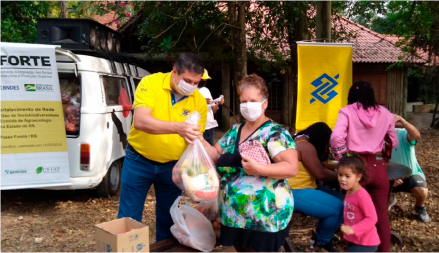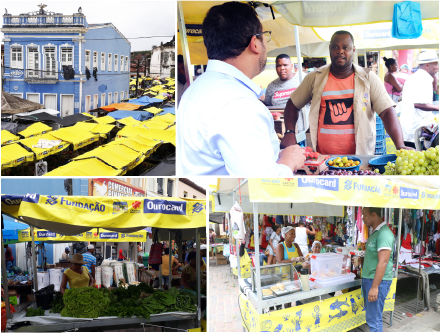Main outcomes
Evaluation of programs and projects

The evaluation process of BB Foundation's programs and projects was revised in 2020 to add greater robustness, efficiency, effectiveness and agility. The approved model improves the evaluation process, giving more effectiveness to the results, security and availability of the information generated and transparency to the actions performed. In addition, the information framework generated by the evaluation may identify the weaknesses and strengths of programs and projects and/or offer strategies for continuous improvement.
Aiming at this improvement in all stages of the evaluation process, BB Foundation was guided by bibliographic references, meetings with members of GIFE and the Brazilian Monitoring and Evaluation Network, in addition to benchmarking with Third Sector institutions. The experience contributed to adjustments in the process of defining indicators, means for data collection and treatment, and disclosure of results.
Among the challenges faced, the need to apply evaluation research entirely remotely is highlighted. Thus, in 2020 Ground Zero evaluations were carried out Ground Zero is the collection of data on the initial situation of the projects and their participants. Its objective is to carry out a situational analysis of the reality of the different social or environmental actors involved in the beginning of a project. The information collected in this phase will serve to guide the planning of future actions and will serve as a guide for the other phases of execution, as well as they can be used to measure the social and environmental impacts of the actions carried out. of the second stage of Programa Ecoforte Redes (Ecoforte Networks Program) Ground One Ground One is applied after the end of the execution of the projects for the purpose of comparison with Ground Zero and verification of the results of the projects. of Projeto Nossa Feira Popular Solidária (Our Solidarity Popular Fair Project) and the evaluation of the outcomes of Covid-19 Humanitarian Action.
The following are the main results observed in some of the evaluations:


Programa Ecoforte Redes (Ecoforte Networks Program)
Carried out in partnership with the National Bank for Social Development - BNDES, the Program is part of Política Nacional de Agroecologia e Produção Orgânica - PNAPO (National Policy on Agroecology and Organic Production) and aims to support territorial projects of agroecology, organic extraction and production networks, aimed at intensifying the sustainable management practices of sociobiodiversity products and organic and agroecological-based production systems.
The second phase of the Program took place through Public Notice 2017/030, in which 28 projects for consolidating and structuring new networks were selected, enabling 9,945 direct participants to be served and social investment totaling BRL 25 million.
BB Foundation's evaluation team carried out a Ground Zero assessment of the initiative, observing general characteristics and variables related to the networks, projects and supported participants, obtaining the following results:
-
40% of the enterprises that make up the networks are associations and
9% are cooperatives;
-
50% of the networks promote training and exchanges aimed specifically at women;
-
40% of networks have never accessed other public policies;
-
33% of the businesses simultaneously use accounting, production and personnel controls in their management process;
-
91% of the enterprises have women occupying leadership roles;
-
43% of the enterprises understand that the support offered by the networks needs to be improved;
-
56% of the participants are female;
-
BRL 1,228 was the average monthly net income per participant;
-
63% of participants never accessed resources from Pronaf - Programa Nacional de Fortalecimento da Agricultura Familiar (National Program for Strengthening Family Farming);
-
64% do not have certification in organic or agroecological production.
Projeto Nossa Feira Popular Solidária (Our Solidarity Popular Fair Project)
This action, implemented within the scope of the Município Mais que Digital – MMQD (More Than Digital Municipality) strategy, of Banco do Brasil, aimed to strengthen open markets/fairs as sociocultural and social spaces, through the involvement of local actors in various initiatives, the revitalization of spaces for circulation, as well as actions aimed at financial education and socioenvironmental responsibility.
In partnership with Cáritas Brazilian, BRL 10.3 million were invested to revitalize the fairs held in 21 cities in the states of Maranhão, Piauí, Paraíba and Bahia, serving 2,768 marketers.
The evaluation of Ground One made it possible to compare the indicators measured in the year 2018 (Ground Zero) and to show the following results of the intervention:


-
an increase of 4% in the direct income of the market/fair vendors;
-
an increase of 12 percentage points in the number of marketers who use digital media in marketing;
-
a variation of 23 percentage points of the fair participants with training in Financial Education;
-
58% of the marketers consider that there was an increase in the number of customers and cultural activities at the fair;
43% consider that the fair is cleaner today;
-
79% consider that there have been improvements in working conditions.
The project was successful in the organization and improvement of the working conditions of the marketers and circulation of customers in the open fairs covered by it. Training in financial education and the revitalization of garbage collection points were also positive aspects of the action.
However, the pandemic caused by Covid-19 affected the dynamics of the fairs, affecting the direct income of marketers and the mobilization process of bank agents in the implementation of Banco do Brasil's Município Mais que Digital (More Than Digital Municipality)strategy.
Covid-19 Humanitarian Action
An important initiative carried out in 2020 aimed at minimizing the negative impacts on the populations affected by the pandemic caused by the new coronavirus, promoting assistance and access actions and maintaining basic human rights.
The action was carried out in partnership with the Federal Government, through Arrecadação Solidária (Solidarity Crowdfunding) project, BB Seguros, Banco Votorantim, Cooperforte, in addition to spontaneous donations, with a total social investment of BRL 60.3 million used in purchasing 9.8 thousand tons of food distributed to 1.7 million people, including specific actions with family farmers and the elderly served by LTCFs (long-term care facilities for the elderly).
The evaluation process aimed to contribute to improving the effectiveness and efficiency of humanitarian actions, the response of organizations to disasters and transparency during the accountability process.
In addition to the figures previously reported, the following results of humanitarian action were observed:
-
49% of the family farmers served had an average income in the range above BRL 1,000;
-
for 39% of farmers, the funds met the basic needs of the family for 4 weeks;
-
for 43% of the elderly and 41% of the general public, the resources provided by the Action were sufficient for 4 weeks;
-
56% of the institutions used public equipment to make donations viable;
-
50% of the institutions rated it as “very satisfied” with respect to the time elapsed between formalizing with BB Foundation and receiving the funds;
-
the average delivery time of the food staples to the public was between 5 and 10 days;
-
94% of institutions rated BB Foundation's performance in confronting Covid-19 as “very important”;
-
100% of the institutions relied on volunteer work.

